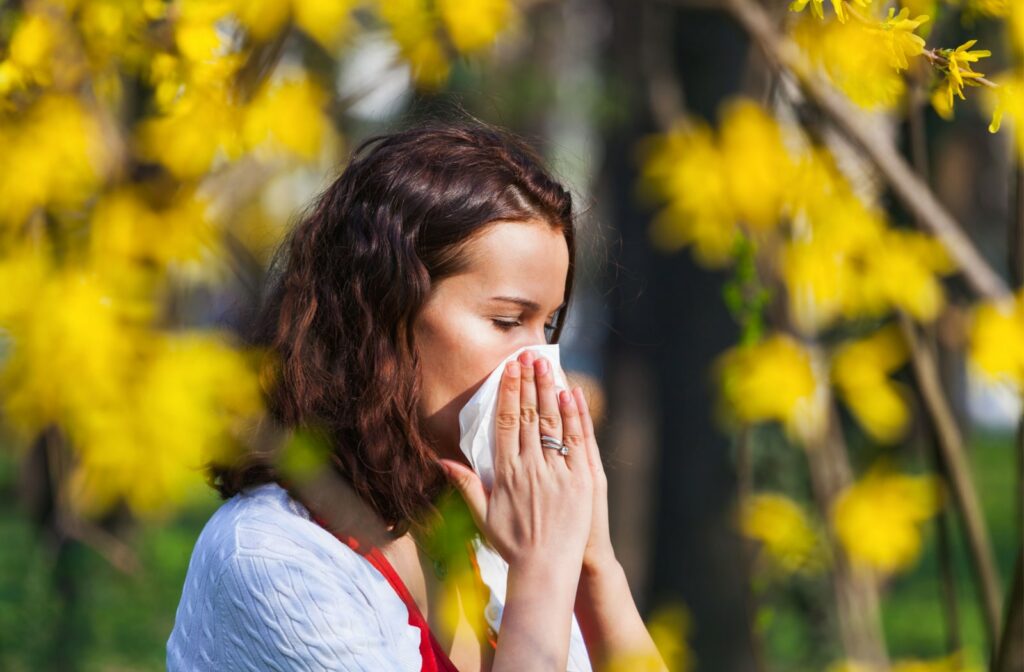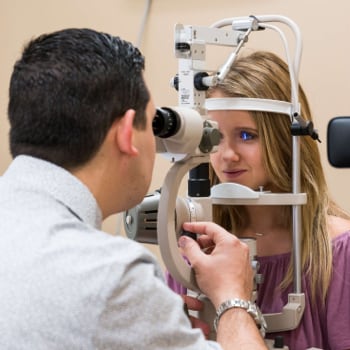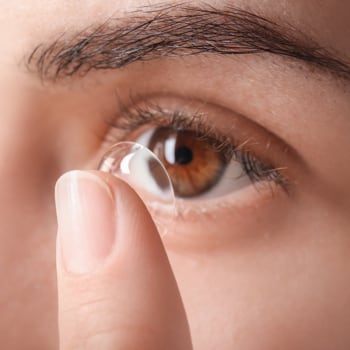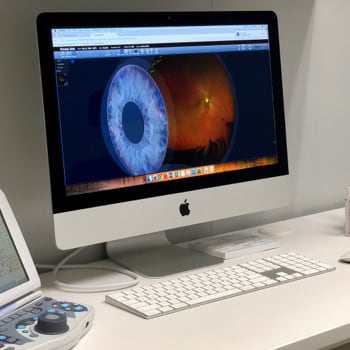Allergies are a common nuisance for many, often causing symptoms like sneezing, itching, and nasal congestion. However, one lesser-known effect of allergies is their impact on our eyes, particularly in causing dry eye syndrome. Allergies can directly affect dry eyes in many different ways including:
- As an inflammatory response
- The effects of antihistamines
- Excessive tearing followed by dryness
In this blog post, we’ll explore the connection between allergies and dry eye, how they interact, and what you can do to alleviate dry eye discomfort.
What is Dry Eye Syndrome?
Dry eye syndrome, or dry eye disease, occurs when your eyes do not produce enough tears or when the tears are of poor quality and evaporate too quickly. This condition can lead to discomfort, redness, stinging, or a gritty sensation in the eyes. Chronic dry eye can also impact your vision, leading to blurred sight and sensitivity to light.
The Risks if Left Untreated
Leaving dry eye and allergies untreated can lead to more severe complications over time. Chronic dry eye can cause permanent damage to the surface of the eye, including scarring and ulcers, which can impair vision. Moreover, the constant irritation and inflammation associated with untreated allergies can weaken the eye’s defenses against infections, potentially leading to conjunctivitis or keratitis.
Additionally, persistent discomfort can significantly impair one’s quality of life, affecting daily activities like reading, driving, and using digital devices. It’s crucial to address these issues not just for immediate relief, but also to prevent long-term damage to your eye health and overall well-being.
The Allergy Connection
Allergies can directly contribute to dry eye in several ways. When allergens like pollen, dust, or pet dander enter the eyes, they trigger an immune response. This response includes the release of histamines, which can cause inflammation and swelling of the eye’s surface and its surrounding tissues. Here’s how this can lead to dry eye:
Inflammatory Response
Allergies cause inflammation that can disrupt the function of the meibomian glands in the eyelids. These glands produce the oil layer of the tear film, which prevents evaporation of the tears. When these glands are not working properly due to inflammation, the tears evaporate more quickly, resulting in dry eyes.
Antihistamines Side Effects
While antihistamines are effective at controlling allergy symptoms, they often have a drying effect on the body, including the tear film. This can exacerbate or lead to dry eye symptoms.
Excessive Tearing Followed by Dryness
Interestingly, initial exposure to allergens can cause excessive tearing as the eye tries to flush out the irritants. However, these are not high-quality tears and are usually too watery to provide lasting relief or protection, leading to subsequent dryness.
Ways to Manage Allergy-Induced Dry Eye
Artificial Tears
Over-the-counter artificial tears can provide relief by supplementing your natural tear production. Look for preservative-free options to avoid further irritation.
Warm Compresses
Applying warm compresses to the eyes can help unclog blocked meibomian glands, thus improving the quality of your tears.
Antihistamine Eye Drops
These can help control eye allergy symptoms without the drying effects that oral antihistamines might cause. However, consult with your doctor to find the best option for your situation.
Omega-3 Fatty Acids
Adding omega-3 supplements to your diet can improve the oil film production by the meibomian glands, thus improving tear quality and reducing dry eye symptoms.
Avoid Allergens
Limiting exposure to allergens can help manage both allergies and dry eye symptoms. Use air purifiers in your home, and try to keep windows closed during high pollen seasons.
When to See a Doctor
If you consistently suffer from dry eye symptoms or if your symptoms are worsening, it’s important to visit an eye care professional. They can offer more specific treatments such as prescription eye drops or procedures to address tear production or improve tear quality.
Take Control of Your Eye Health
Don’t let dry eyes and allergies diminish your quality of life. At Great Hills Eye Care, we’re dedicated to providing personalized solutions to protect and enhance your vision and eye health. Our team of experts uses the latest technologies and treatments to diagnose and manage dry eye and allergy symptoms effectively.
Schedule your appointment today to see how we can help you find relief and maintain optimal eye health. Remember, taking care of your eyes today ensures a clearer tomorrow. Contact Great Hills Eye Care and take the first step towards better eye care!














